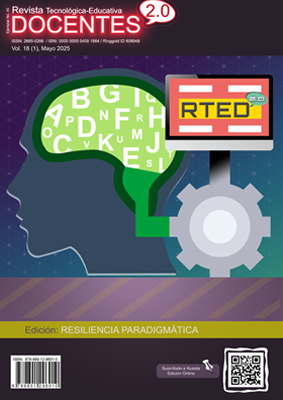Study Habits in Entering Undergraduate Students
 DOI:
https://doi.org/10.37843/rted.v18i1.605
DOI:
https://doi.org/10.37843/rted.v18i1.605
Main Article Content
Abstract
With the beginning of university life and its multiple demands, students undergo an adjustment process where they must use academic skills to adapt to the pace of the demands and satisfactorily meet each of them. This research aimed to know the characteristics of study habits among new university students in the Bachelor of Business Administration, Medicine, and Psychology at the Autonomous University of Baja California. The research was based on the positivist paradigm, quantitative approach, and descriptive-transversal type. The sample consisted of 269 higher education students. For data collection, the study habits questionnaire was used. The results obtained identified a prevalence in those skills, such as motivation to study, distinguishing itself as a positive resource about the teaching-learning process, in turn, that skill to consider to develop necessary strategies to improve the distribution of time of newly admitted university students.
Downloads
Metrics
Article Details

This work is licensed under a Creative Commons Attribution-NonCommercial-NoDerivatives 4.0 International License.
Those authors who have publications in our journal accept the following terms:
- When a work is accepted for publication, the author retains rights of reproduction, distribution of his/her article for exploitation in all countries of the world in the format provided by our magazine and any other magnetic medium, optical, and digital.
- Authors will retain their copyright and guarantee the journal the right first to publish their work, which will be simultaneously subject to the Creative Commons Acknowledgment License (Attribution-NonCommercial-NoDerivatives 4.0 International (CC BY-NC-ND 4.0)). That allows third parties to copy and redistribute the material in any medium or format, under the following conditions: Acknowledgment - You must properly acknowledge authorship, provide a link to the license, and indicate if any changes have been made. You may do so in any reasonable way, but not in a way that suggests you have the licensor's endorsement or receive it for your use. NonCommercial - You may not use the material for a commercial purpose. NoDerivatives - If you remix, transform, or build from the material, you cannot broadcast the modified material. There are no additional restrictions - You cannot apply legal terms or technological measures that legally restrict you from doing what the license allows.
- Authors may adopt other non-exclusive license agreements to distribute the published version of the work (e.g., deposit it in an institutional archive or publish it in a monographic volume) provided that the initial publication in this journal is indicated.
- Authors are allowed and recommended to disseminate their work through the Internet (e.g., in institutional telematic archives, repositories, libraries, or their website), producing exciting exchanges and increasing the published work's citations.
- Request of withdrawal an article has to be done in writing by the author to the Editor, becoming effective after a written response from the Editor. For this purpose, the author or authors will send correspondence via e-mail: [email protected].
- The author will not receive financial compensation for the publication of his work.
- All Docentes 2.0 Journal publications are under the Open Journal System (OJS) platform at: https://ojs.docentes20.com/.
References
Alonzo Rivera, D. L., Valencia Gutiérrez, M. C., & Vargas Contreras, J. A. (2018). La habilidad de autoevaluación de hábitos de estudio. Revista Varela, 18(49), 69-81. https://n9.cl/e8end
Bedolla Solano, R. (2018). Programa educativo enfocado a las técnicas y hábitos de estudio para lograr aprendizajes sustentables en estudiantes de nuevo ingreso al nivel superior. Revista Iberoamericana de Educación, 76(2), 73-94. https://doi.org/10.35362/rie7622959 DOI: https://doi.org/10.35362/rie7622959
Broc Cavero, M. Á. (2011). Voluntad para estudiar, regulación del esfuerzo, gestión eficaz del tiempo y rendimiento académico en alumnos universitarios. Revista de Investigación Educativa, 29(1), 171-185. https://n9.cl/mmkvx
Chilca Alva, M. L. (2017). Autoestima, hábitos de estudio y rendimiento académico en estudiantes universitarios. Propósitos y Representaciones, 5(1), 71-127. https://doi.org/10.20511/pyr2017.v5n1.145 DOI: https://doi.org/10.20511/pyr2017.v5n1.145
Díaz. J.L (1991). Aprende a estudiar con éxito. Trillas.
Lassibille, G., & Gómez, M. L. (1990). El Valor Del Tiempo en la Universidad. UMA Editorial. https://n9.cl/g80x5
Martínez, A., & Montaño, A. (2004). Hábitos de estudio y estrategias de aprendizaje en alumnos de nivel superior. Universidad Autónoma de Baja California.
Martínez Soto, Y., Lechuga Moreno, E. I., Aceves Villanueva, Y., & Barak Velásquez, M. M. (2020). Habilidades socioemocionales en el ámbito universitario. Editorial Artificios. https://n9.cl/q9aha8
Najarro Vargas, J. (2020). Hábitos de estudio y su relación con el rendimiento académico de los estudiantes del segundo año de la Escuela Profesional de Medicina de la Universidad Nacional de San Marcos, Perú. Revista Conrado, 16(77), 354-363. https://n9.cl/mt1bub
Pinillos-Patiño, Y., Rebolledo-Cobos, R., Herazo-Beltrán, Y., Oviedo-Argumedo, E., Guerrero Ospino, M., Valencia-Fontalvo, P., & Cortés-Moreno, G. (2022). Estilo de vida en adultos jóvenes universitarios de Barranquilla, Colombia. Diferencias según sexo y estatus socioeconómico. Retos, 43(1), 979-987. https://n9.cl/lnmyj DOI: https://doi.org/10.47197/retos.v43i0.87335
Ricoy Lorenzo, C. (2006). Contribución sobre los paradigmas de investigación. Revista do Centro de Educação, vol. 31, núm. 1, 2006, pp. 11-22 https://n9.cl/9cu2h
Solano Dávila, O. L., Salas Vásquez, B. J., Manrique Flores, S. M., & Núñez Lira, L. A. (2022). Relación entre hábitos de estudio y estrés académico en los estudiantes universitarios del área de Ciencias Básicas de Lima Perú. Revista Ciencias De La Salud, 20(1), 1-15. https://n9.cl/srx9n DOI: https://doi.org/10.12804/revistas.urosario.edu.co/revsalud/a.10716
Soto, W., & Rocha, N. (2020). Hábitos de estudio: factor crucial para el buen rendimiento académico. Revista Innova Educación, 2(3), 432-445. https://doi.org/10.35622/j.rie.2020.03.004 DOI: https://doi.org/10.35622/j.rie.2020.03.004
Tinto, V. (1993). El abandono de los estudios superiores: Una nueva perspectiva de las causas de abandono y su tratamiento. Universidad Nacional Autónoma de México. https://n9.cl/khkih
Villa Sánchez, A., & Poblete, M. (2007). Aprendizaje basado en competencias: Una propuesta para la evaluación de las competencias genéricas. Universidad de Deusto. https://n9.cl/01vc






